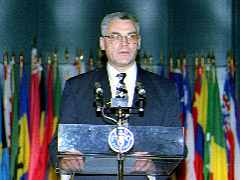


ESTONIA - ESTONIE | ||
His Excellency Ilmar Mändmets, Minister for Agriculture of the Republic of Estonia | ||

It is an honour to address this distinguished audience. First of all, allow me to express my admiration to the Director-General for the idea and organization of this truly historic event in support of the world's hungry and undernourished. May I also express my appreciation to the Italian Government for its generous support of this event. Estonia is a small northern country of 1.5 million inhabitants of whom only some 960 000 are Estonians. Hunger in Estonia is still remembered in connection with the last war at the beginning of the 1940s. We do, however, have to acknowledge that some small groups of inhabitants suffering from malnutrition still do exist in Estonia. But this is not a problem of agriculture as, up to the 1940s, Estonia was a relatively important exporter of agricultural produce to different parts of the world. After 1950, the one direction forced on Estonia was to reduce agricultural production to the East. Price relations were distorted and quality requirements were low which led to relatively non-efficient agricultural production orientated towards quantity. After full liberalization of our markets at the beginning of the 1990s our agricultural production decreased considerably. Now, with the stabilization of production even an increase in some branches has occurred. Private ownership, high quality and competitiveness are the best guarantees for the development of rural life and agriculture. In Estonia the problem of the undernourished and problems of agricultural production yields are not so closely connected because of our totally free market policy. So hunger is not caused by lack of food availability but by lack of accessibility. The situation of world trade in agricultural commodities and the socio-economic and educational structures are the actual gist of the problem. How to solve the problem? First of all, education. Estonia was one of the first European countries to achieve almost 100 percent literacy at the end of the last century. This has helped us to better face the challenges of history, to lessen the hostility between different nations and avoid conflicts as well as to enable us to adapt to the present economic changes now taking place. The high educational level in Estonia has served as a basis for retraining and for maintaining our present high level of employment. Secondly, social measures to balance the distribution of wealth, to ensure state support to the most vulnerable groups and avoid unemployment. Here the question is, what is to be for us the optimal role of the state? Thirdly, equal trade conditions and opportunities for all countries to utilize more efficiently their relative advantages in food production integrated throughout sustainable rural life. Here one has to consider that there is a price for all the resources being used in food production and in transport, such as water and fuel in particular. The establishment of correct prices in food production and of inputs as well as the establishment of equal trade conditions is an extremely complicated problem. It is connected with different interests which are often contradictory and not easy to treat. This we could see during the Uruguay Round. Still the process has to go on; there is no other solution. Situations and solutions are very different in different regions. The problems of transition of the Central and Eastern European countries cannot be compared with the problems of the countries suffering from malnutrition. The resources of food production in the CEE countries have to be adequately evaluated in order to find their optimal use. In the course of solving their problems, these countries will very soon be partners in solving the problems of countries where food problems are particularly acute. Estonia could also offer its specialists to help the suffering countries to find the long-term solutions they need instead of short-term food aid. In closing, the strongest wish of all peoples is to be in charge in their own country, to own their land, to have access to education. For all this we need peace, trust and understanding between different nations and countries, the honour of the right to live. I believe that we can together resolve the problems of Food for All together. | ||
|
|
|
|

 |